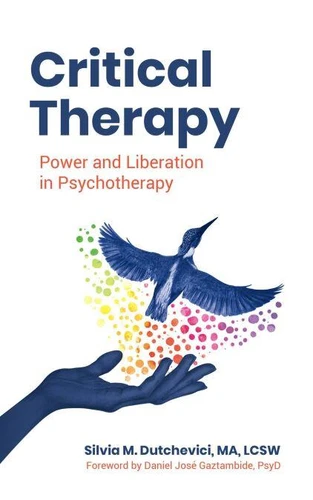Critical Therapy
Par :Formats :
Disponible dans votre compte client Decitre ou Furet du Nord dès validation de votre commande. Le format ePub est :
- Compatible avec une lecture sur My Vivlio (smartphone, tablette, ordinateur)
- Compatible avec une lecture sur liseuses Vivlio
- Pour les liseuses autres que Vivlio, vous devez utiliser le logiciel Adobe Digital Edition. Non compatible avec la lecture sur les liseuses Kindle, Remarkable et Sony
 , qui est-ce ?
, qui est-ce ?Notre partenaire de plateforme de lecture numérique où vous retrouverez l'ensemble de vos ebooks gratuitement
Pour en savoir plus sur nos ebooks, consultez notre aide en ligne ici
- FormatePub
- ISBN978-0-578-37727-8
- EAN9780578377278
- Date de parution07/09/2022
- Protection num.pas de protection
- Infos supplémentairesepub
- ÉditeurEditeurs divers USA
Résumé
Not all revolutions begin in the street. Sometimes, they start in the psychotherapy office, on the couch. Psychotherapy needs a revolution. Historically, its goal has been to accommodate individuals to oppressive social systems. In this revealing and timely book, practicing psychotherapist, Silvia Dutchevici, provides a long-overdue social-justice model for therapy aiming toward liberation and personal agency.
In Critical Therapy: Power and Liberation in Psychotherapy, patients and therapists are invited to look closely at ways power works in relationships. Drawing on liberation psychology scholarship and a decade of practice, Dutchevici examines how the therapeutic relationship itself is shaped by issues-such as money, race, class, and gender-often considered taboo. In offering more than comfort and insight, critical therapy supports patients as they awaken their own transformative power; create collaborative relationships, workspaces, and environments; and come to see themselves as agents of change in a still unfinished democracy. Written in simple and concise language, Critical Therapy is a must-read for anyone who has had, is thinking of having, or is practicing psychotherapy.
In Critical Therapy: Power and Liberation in Psychotherapy, patients and therapists are invited to look closely at ways power works in relationships. Drawing on liberation psychology scholarship and a decade of practice, Dutchevici examines how the therapeutic relationship itself is shaped by issues-such as money, race, class, and gender-often considered taboo. In offering more than comfort and insight, critical therapy supports patients as they awaken their own transformative power; create collaborative relationships, workspaces, and environments; and come to see themselves as agents of change in a still unfinished democracy. Written in simple and concise language, Critical Therapy is a must-read for anyone who has had, is thinking of having, or is practicing psychotherapy.
Not all revolutions begin in the street. Sometimes, they start in the psychotherapy office, on the couch. Psychotherapy needs a revolution. Historically, its goal has been to accommodate individuals to oppressive social systems. In this revealing and timely book, practicing psychotherapist, Silvia Dutchevici, provides a long-overdue social-justice model for therapy aiming toward liberation and personal agency.
In Critical Therapy: Power and Liberation in Psychotherapy, patients and therapists are invited to look closely at ways power works in relationships. Drawing on liberation psychology scholarship and a decade of practice, Dutchevici examines how the therapeutic relationship itself is shaped by issues-such as money, race, class, and gender-often considered taboo. In offering more than comfort and insight, critical therapy supports patients as they awaken their own transformative power; create collaborative relationships, workspaces, and environments; and come to see themselves as agents of change in a still unfinished democracy. Written in simple and concise language, Critical Therapy is a must-read for anyone who has had, is thinking of having, or is practicing psychotherapy.
In Critical Therapy: Power and Liberation in Psychotherapy, patients and therapists are invited to look closely at ways power works in relationships. Drawing on liberation psychology scholarship and a decade of practice, Dutchevici examines how the therapeutic relationship itself is shaped by issues-such as money, race, class, and gender-often considered taboo. In offering more than comfort and insight, critical therapy supports patients as they awaken their own transformative power; create collaborative relationships, workspaces, and environments; and come to see themselves as agents of change in a still unfinished democracy. Written in simple and concise language, Critical Therapy is a must-read for anyone who has had, is thinking of having, or is practicing psychotherapy.



